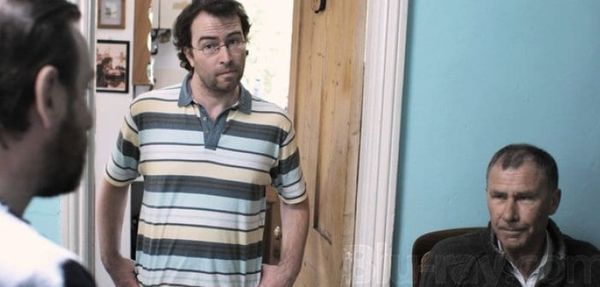Eye For Film >> Movies >> Down Terrace (2009) Film Review

Comedy is a funny business. It can be as light as candyfloss or as sinister as an oil slick, which is probably why some people find clowns so very disturbing - on the one hand a thing of ridicule on the other, a disturbingly 'masked' embodiment of uncertainty. Ben Wheatley and Robin Hill's debut feature is as serious as the tears of a clown, pulling the plug on the usual gangland cliches and taking their killers back to the kitchen sink. The result is a black comedy reminiscent of the likes of Alan Bleasdale and early Ken Loach, but which is also distinctly unnerving.
And yet, what can be more ordinary than a terraced house? Sitting innocently in suburban Brighton, the family it contains are at once utterly banal and worryingly psychotic. Karl and his Dad Big Bill (played by Hill and his real-life father Robert) are fresh from escaping a prison term after four months' remand and, back home, they and their extended family consider who may have grassed them up over tea and a biccie.

Big Bill has a mostly zen approach to the art of criminality, seemingly preferring to play folk tunes on his guitar, although it is clear he is not to be crossed, while Karl, despite the outward appearance of normality, soon comes to display a high level of arrested development and a very short fuse. Watching over both is long-suffering matriarch Maggie (the fabulous Julia Deakin), who quickly shapes up to be Lady Macbeth in Marigolds. And if a snitch in their midst is not enough, Karl's ex (played by Robin's real-life wife Kerry Peacock) arrives on the doorstep with a bun in the oven she claims he put there.
By mixing the situations of a crime drama with dysfunctional family dynamics, the everyday becomes accentuated, meaning that outbreaks of violence are absurdly comic but still retain a nasty edge. Additional characters push this absurdity even further, such as hitman Pringle (Michael Smiley), who in a flourish of modern parenting problems, brings his three-year-old son (played by Robin's real-life daughter Kitty Blue) along on a job.
There is no denying the film is low-budget. In addition to Robin Hill casting just about everyone in his family (his sister-in-law and mum also turn up in very brief cameos), with the exception of a handful of scenes, the entire film is set in his parent's home, facts which only add to the documentary feel.
Director of Photography Laurie Rose deserves praise for his excellent handheld camerawork that makes a virtue of the claustrophobic nature of the house. His intuitive use of the camera is all the more impressive when you consider that most scenes were done in one or two takes, one of which would be semi-improvised and, when they are in the confines of the house, he keeps his framing in the face of the central characters. The acting is uniformly excellent, with a resolute downplaying of each scene which gives the humour an organic, natural feel.
As the body count begins to stack up, the tension starts to haemorrhage out somewhat but the climax of the film is a fitting one even if it does stray into predictable territory. With wins at Raindance and the British Independent Film Awards and plenty of festival play in the US, Wheatley, Hill and Rose are all on the rise and it will be interesting to see what they do with a bigger budget and less familiar setting in the future.
Reviewed on: 18 Aug 2010


















